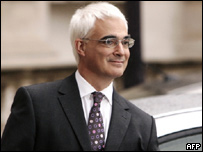Take Away English-The Budget 财政预算
时间:2019-01-02 作者:英语课 分类:Take Away English

The British finance minister, Alistair Darling
It's the time of year when the British taxpayer 1 finds out how much the cost of beer, cigarettes and petrol - amongst other things - will go up in the coming twelve months.
The Budget is the annual financial statement and review of the levels of taxation 2. The Budget speech includes a statement of the Government's medium-term financial strategy and the short-term economic forecast.
Taxes are used by the government to try to control the British economy as well as to raise revenue to meet expenditure 3 for the year.
However, people are mainly interested in how changes in taxes and benefits will affect them. For example, if income tax goes up they will have less money, but parents may be happy because child benefit has risen.
The Budget speech is prepared and delivered by the finance minister, known as the chancellor 4 of the exchequer 5, or simply 'the chancellor' for short.
A number of traditions surround the Budget speech. For example, the chancellor gets to his feet in the House of Commons at 12:30 pm. He is heard uninterrupted by members of parliament.
According to tradition, the chancellor is allowed to drink alcohol during the speech, though these days water is preferred.
The statement lasts about an hour. Afterwards, the leader of the opposition 6 gets a chance to respond and criticise 7 the government's plans. Four days of general debate follow.
This year's Budget is the first since Gordon Brown became prime minister. Alistair Darling, his replacement 8 at the Treasury 9, makes his first Budget speech since becoming chancellor.
GLOSSARY 词汇表
taxpayer
纳税人
financial statement
财政报告
medium-term financial strategy
中期金融策略
revenue
收入
benefits
福利
child benefit
儿童福利
chancellor of the exchequer
(英国对财政部长的称呼)财政大臣
uninterrupted
不被打断的
leader of the opposition
反对党领导
general debate
广泛的讨论
the budget
预算
taxation
税收
short-term economic forecast
短期经济前景预报
expenditure
支出
income tax
个人所得税
finance minister
财政部长
House of Commons
下院(众议院)
members of parliament
议会成员
criticise
批评
the Treasury
财政部
- The new scheme will run off with a lot of the taxpayer's money.这项新计划将用去纳税人许多钱。
- The taxpayer are unfavourably disposed towards the recent tax increase.纳税者对最近的增加税收十分反感。
- He made a number of simplifications in the taxation system.他在税制上作了一些简化。
- The increase of taxation is an important fiscal policy.增税是一项重要的财政政策。
- The entry of all expenditure is necessary.有必要把一切开支入账。
- The monthly expenditure of our family is four hundred dollars altogether.我们一家的开销每月共计四百元。
- They submitted their reports to the Chancellor yesterday.他们昨天向财政大臣递交了报告。
- He was regarded as the most successful Chancellor of modern times.他被认为是现代最成功的财政大臣。
- In Britain the Chancellor of the Exchequer deals with taxes and government spending.英国的财政大臣负责税务和政府的开支。
- This resulted in a considerable loss to the exchequer.这使国库遭受了重大损失。
- The party leader is facing opposition in his own backyard.该党领袖在自己的党內遇到了反对。
- The police tried to break down the prisoner's opposition.警察设法制住了那个囚犯的反抗。
- Right and left have much cause to criticise government.左翼和右翼有很多理由批评政府。
- It is not your place to criticise or suggest improvements!提出批评或给予改进建议并不是你的责任!
- We are hard put to find a replacement for our assistant.我们很难找到一个人来代替我们的助手。
- They put all the students through the replacement examination.他们让所有的学生参加分班考试。